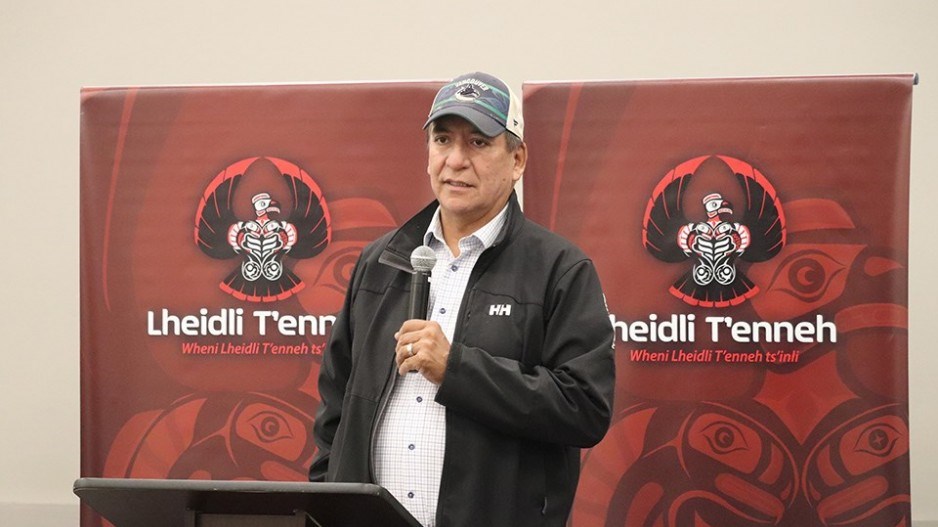An agreement to proceed with a plan to build a $5-7 billion hydrogen plant located on the Kerry Lake East Indian Reserve, 90 kilometres north of Prince George, could be in place by Sept. 30.
Harvey Chingee, chief of the McLeod Lake Indian Band, says negotiations are continuing with Mitsubishi Power to complete the deal and he expects it will be done before that deadline.
Chingee says all the necessary infrastructure to operate the plant is in place at the site, which is about two kilometres east of Highway 97.
“It will be huge, like a big pulp mill,” said Chingee. “We’ve got the electricity, we’ve got the water, we’ve got the highway and we’ve got the railway, and the pipelines are all there.”
The plant will use electricity to split water molecules into their basic elements – two parts hydrogen and one part oxygen – using a process called hydrolysis. The problem with hydrogen is it is the lightest element on earth and it’s not feasible to compress the gas enough for it to be transported.
The solution is to convert it to liquid ammonia, which would then be shipped in railcars to the port facility in Prince Rupert, which is gearing up with an expansion to be better equipped to handle large-scale ammonia shipments.
“We’re negotiating right now with CN, and we’re also negotiating an agreement with BC Hydro, because it will take a lot of power,” said Chingee.
Chingee does not anticipate opposition from other First Nations whose territory the ammonia shipments will eventually pass through.
“We’ve already got the right-of-way identified,” he said. “They’ve been hauling (petroleum) condensate to Prince Rupert since the 1960s and they’re still doing it and there hasn’t been a spill. The rail is already there, that’s the beauty of it. Existing infrastructure is already there and there’s no need for consultations and all this other stuff.”
A five km rail spur line would be needed to connect to the CN line. The existing BC Hydro transmission line is about two kilometres from the proposed site. Water would be drawn from the nearby Crooked River.
The plant would produce ‘green hydrogen’ generated from non-fossil fuel sources (electricity) as well as ‘blue hydrogen’ made using natural gas.
A $2 billion straddle reprocessing plant would also be built at the site to recover and refine natural gas products to be fed into the Coastal GasLink LNG pipeline that runs through the area. Construction of that 670-kilometre pipeline which from runs from Dawson Creek to Kitimat is expected to be complete later this year.
The McLeod Lake band is working with Pacific Natural Gas to reactivate its compressor station near Summit Lake and with Pembina Pipeline Corporation to create the pipeline infrastructure needed for the project.
Surveying of the plant site, 32 km north of McLeod Lake, is set to begin July 15 and Chingee says the area will be logged this winter. If an agreement is reached by September he said construction would begin in May 2024, to be completed within two years.
Plant construction will require an estimated 600 workers. A temporary work camp as well as some permanent housing will be built, Chingee said. It will ultimately create 250 permanent jobs, which will have an economic boost to the region, with Prince George as the plant's service hub.
Because of its potential to produce zero-emission clean energy, the plant is expected to have financial backing from the provincial and federal governments. On May 30, the BC government announced the renewal of an energy and minerals partnership with Japan.
Chingee says Mitsubishi will handle details of the financing needed to get the plant built.
“All we’re doing is leasing the land to them and doing a revenue share off the top,” he said. “We’ll lease the land and it will be secure for 99 years. There’s no risk to the nation and a big upside.”
Chingee says the hydrogen plant will provide well-paying jobs for the people of his area, on a much larger scale than the McLeod Lake band’s forestry/logging/construction firm, Duz Cho Group of Companies.
“Economically it will improve us substantially and we’ll become one of the economic forces in First Nations country, “ said Chingee. “Once we start making money, we start diversifying and educating people, combating all the social ills that are out there, hard and heavy.”
Partners in the hydrogen project plan will be meeting Premier David Eby on July 18, hoping to acquire access to a parcel of level Crown land at the 2,000 hectare site.
Hydrogen industry expert Matthew Klippenstein says Asian countries such as Japan, Korea and Taiwan are actively seeking clean energy to meet their own emission standards and replace coal as a heat source and he said other large-scale hydrogen projects are being considered Alberta and the Maritimes.
The idea to build the plant in northern B.C. grew out of a chance encounter in a bar in Las Vegas.
“Our negotiator met one of their (Mitsubishi) guys at a Golden Knights hockey game a couple years ago,” said Chingee. “They came up last fall and looked around at the site. They’re quite serious. The (Mitsubishi) senior VP says it’s a go, let’s make it happen.”
Last week, Chingee toured the Mitsubishi Power Americas/Magnum Development Advanced Clean Energy Storage Hub in Delta, Utah, south of Salt Lake City, which has been under construction since July 2022. The plant will produce hydrogen from electricity and store it in huge underground salt caverns, to be used as means of generating electricity using combined cycle gas turbines.




